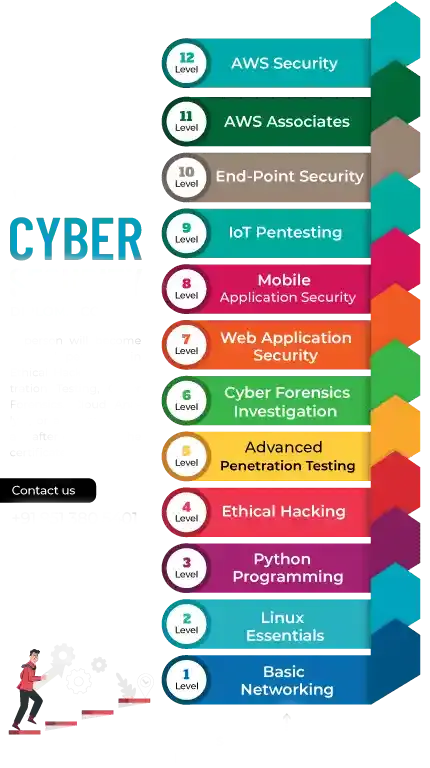What is the Prerequisite To Learn Cyber Security?

What is the Prerequisite To Learn Cyber Security?
Introduction to Cyber Security
Within this age which is characterized by constantly shifting digital environments, the criticality of cybersecurity cannot be emphasized enough. The field of IT security is committed to safeguarding hardware, software, and data of systems that are connected to the internet against malicious cyberattacks.
At an all-time high, the demand for proficient cybersecurity personnel is due to a growing number of cyber threats. Craw Security, which is widely recognized as the preeminent cybersecurity training institute in India, is at the vanguard of equipping individuals with the necessary skills to confront these obstacles directly.
Understanding the Basics
Before discussing the foundational requirements for studying cybersecurity, it is essential to grasp its fundamentals. Cybersecurity comprises a variety of procedures, technologies, and practices that are specifically engineered to safeguard data, programs, networks, devices, and information against unauthorized access, harm, or attack. It is a critical component of information technology utilized by businesses of all sizes and in all industries.
Prerequisites for Learning Cyber Security
While there is no specific degree or background requirement to learn cybersecurity, there are a few prerequisites that may facilitate a more efficient comprehension of the concepts:
| Basic Computer Skills | It is essential to have a fundamental comprehension of how computers and networks function. This entails having a basic understanding of operating systems such as MacOS, Linux, and Windows. |
| Networking Knowledge | Due to the fact that cybersecurity entails safeguarding networked systems, it is advantageous to have a fundamental comprehension of networking principles, such as the OSI model, TCP/IP, and prevalent networking devices. |
| Programming Knowledge | Although not required, proficiency in programming languages such as Python, JavaScript, or C++ can be beneficial, particularly in domains such as malware analysis and penetration testing. |
| Understanding of Security Principles | Entrance into the field requires a fundamental understanding of security concepts, including confidentiality, integrity, and availability (formally known as the CIA trinity). |
Essential Knowledge Areas
To establish a solid foundation in cybersecurity, it is critical to concentrate on the following:
| Information Security | Comprehending the fundamentals of information security, such as authentication, encryption, and security protocols. |
| System Security | Acquiring knowledge on how to defend operating systems and the programs that operate on them against cyber threats. |
| Network Security | Acquiring knowledge regarding the safeguarding of components and networks against illicit access and attacks. |
| Web Security | Gaining knowledge of the necessary security protocols to safeguard websites and web applications against cyber threats. |
Building a Strong Foundation
It is essential for those who aspire to enter the cybersecurity industry to establish a firm foundation. In addition to theoretical knowledge, practical experience is required for this. Engaging in cybersecurity seminars, bootcamps, and practical training sessions can yield substantial advantages. These cybersecurity best practices offer full-on cybersecurity education through a combination of suitable training programs and hands-on practical exposure facilitated by highly experienced and well-qualified training professionals.
In this context, Craw Security and similar institutes offer comprehensive training programs that encompass these critical domains, incorporating both theoretical knowledge and hands-on experience.
Advanced Topics in Cyber Security
Once the basics are mastered, learners can explore advanced topics such as:
| Ethical Hacking | Developing an understanding of the methodologies and abilities that hackers employ to conduct penetration testing and detect vulnerabilities. |
| Digital Forensics | The investigation and analysis of digital offenses through the retrieval and examination of digital data. |
| Incident Response | Comprehending the protocols involved in the identification, mitigation, and recovery of cyber breaches. |
| Cloud Security | Protecting environments for cloud computing from attacks and vulnerabilities. |
Keeping Up with Cyber Security Trends
Cybersecurity is a dynamic discipline in which new technologies and threats emerge frequently. Remaining informed about the most recent developments, risks, and trends is essential for professionals in the field. Professionals can maintain their knowledge of cybersecurity by engaging in activities such as the following:
- Attending Conferences,
- Getting in touch with professionals,
- Stay updated with the latest cybersecurity news,
- Be aware of the latest developments,
- Acquire more info on new Governmental reforms of IT Security,
- Participating in Online Forums,
- Subscribing to Reputable Publications, etc.
FAQs
About Prerequisite To Learn Cyber Security
1: Do I need a degree in computer science to learn cyber security?
No, obtaining cybersecurity knowledge does not strictly require a computer science degree. Although possessing a computer science background can offer a solid groundwork in computing principles and technical proficiencies that are advantageous in the realm of cybersecurity, individuals with degrees in other disciplines or even those lacking a formal degree can also enter the field.
A considerable number of cybersecurity experts have made the transition from alternative disciplines, attaining their expertise via practical experience, certifications, bootcamps, and independent study. A keen interest in technology, a readiness to acquire knowledge, and a commitment to remaining informed about the most recent cybersecurity developments and risks are of utmost importance.
2: What programming languages should I learn for cyber security?
It is advantageous to acquire proficiency in programming languages that are widely employed within the domain of cybersecurity, such as:
- Python,
- JavaScript,
- C/C++,
- SQL,
- Bash/Shell scripting, etc.
3: How important are certifications in cyber security?
Certifications hold significant importance within the realm of cybersecurity. In numerous cybersecurity positions, they validate your knowledge and abilities to employers, furnish a structured learning path, and frequently function as a benchmark for employment decisions. Prominent credentials that can substantially improve one’s career opportunities include CompTIA Security+, 1 Year Cyber Security Diploma by Craw Security, Certified Ethical Hacker (CEH), and Offensive Security Certified Professional (OSCP).
4: Can I learn cyber security on my own?
Yes, it is truly possible to acquire cybersecurity knowledge independently. You can acquire cybersecurity concepts and skills at your own tempo through the internet’s plethora of resources, which include online courses, tutorials, blogs, and forums. In addition to practical initiatives and participation in cybersecurity competitions (e.g., Capture The Flag (CTF) challenges), these activities can further one’s education.
Nevertheless, self-directed learning necessitates diligence, inspiration, and an active inclination to locate and participate in educational resources and online communities.
5: What is the most important skill in cyber security?
While technical expertise is essential in the field of cybersecurity, the capacity to think like an assailant, commonly known as the “hacker mindset,” is arguably the most critical quality. This requires one to comprehend the thought processes of assailants, predict possible vulnerabilities, and maintain a proactive stance against threats.
Successfully identifying and mitigating security vulnerabilities requires a blend of technical expertise, innovative thinking, problem-solving prowess, and ongoing education. Furthermore, proficient communication abilities are critical for effectively elucidating technical matters to stakeholders lacking technical expertise.
Conclusion
In a nutshell, although there exist distinct preconditions for acquiring knowledge in the field of cybersecurity, an insatiable eagerness to learn and an enthusiasm for technology are of equal significance. A promising career in cybersecurity is attainable for those who possess the necessary knowledge and skills as well as a dedication to continuous learning.
Furthermore, Craw Security and similar institutes have a significant impact on the development of cybersecurity professionals by offering the training and resources required to satisfy the industry’s expanding needs. Hence, you can even enquire about other things like upcoming batches of 1 Year Cybersecurity Diploma by Craw Security by making a call at our hotline number +91-9513805401 and having a chat with our efficient study consultants.


















